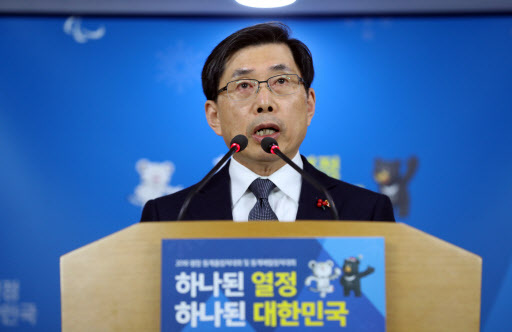President Moon Jae-in granted pardons to 6,444 people Friday, including an ex-liberal lawmaker, evictees involved in the deadly Yongsan disaster and migrant workers, which the presidential office said aims to help ordinary people without money or power and foster unity.
In a reversal of tradition, business tycoons, political bigwigs and close associates of the president were excluded from the presidential pardons executed for the first time since President Moon Jae-in came to power in May.
 |
Justice Minister Park Sang-ki (Yonhap) |
“This amnesty is aimed at relieving the burden of ordinary citizens facing difficulties due to criminal punishment or administrative restrictions, and offering them chances to return to a normal social life early,” said Justice Minister Park Sang-ki at a press briefing held at Seoul Government Complex.
As of Saturday, 6,444 people -- mostly minor criminal offenders who violated traffic laws and committed petty crimes while trying to make a living -- will be pardoned. Administrative restrictions -- such as the cancellation of a driver’s license -- which were placed on 1.6 million people will be lifted.
Among the pardoned are 25 people who had been convicted for their roles in a violent clash in Yongsan, central Seoul in 2009. They were staging a sit-in against the government’s decision to forcibly evict them as part of its urban renewal plan. A fire broke out when the police were confronting them, which resulted in the death of five protestors and one police officer.
“To heal social conflicts and unite the Korean people, the government pardoned evictees in the Yongsan incident -- an iconic public safety-related case done with an investigation and trial,” Minister Park said.
Chung Bong-ju is the only political criminal to be pardoned. He served one year in prison for violation of election law after raising allegations over then-conservative frontrunner Lee Myung-bak’s involvement in stock price rigging ahead of the 2007 presidential race. The pardon reinstated his right to run for elected office until 2022.
Also, 24 migrant workers, the elderly aged over 70, those suffering from serious illness and two inmates who gave birth in prison received clemency.
The government kept business tycoons and bureaucrats accused of corruption, as well as those who committed felonies such as rape and murder off the list, which it said was an effort to uphold the rule of law.
Under the last four administrations, scores of executives of powerful family-run conglomerates, including Samsung, Hyunai Motor and SK, were granted amnesty after a conviction of mostly corporate crimes in return for their promises to spur the nation’s economic growth and create jobs.
On the campaign trail, President Moon vowed not to pardon those involved in corruption and economic crimes, which appears to come in line with his key principles in governing state affairs -- rooting “accumulated ills” in society and achieving an “economic democratization.”
Some controversial figures who might provoke a political divide were excluded.
Han Sang-gyun, a chief of the Korean Confederation of Trade Unions who was convicted of leading illegal rallies, was not pardoned. Han is serving a three-year prison term for leading anti-government rallies in protest against ousted President Park Geun-hye’s labor policies in 2015.
Lee Seok-gi, a former lawmaker of the now-disbanded Unified Progressive Party, was also not given amnesty. In 2015, Lee was convicted of violating the National Security Law for plotting an armed revolt and is serving a nine-year prison term.
Labor activists have demanded their release, calling them “conscientious prisoners.”
By Ock Hyun-ju (
laeticia.ock@heraldcorp.com)








